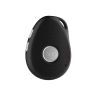An Emergency Button For Seniors
Medical alert systems provide seniors with an easy and quick way to contact help in an emergency, whether due to falls, illness, or accidents. Knowing that help is only a button press away can ease concerns for family and friends while giving seniors confidence that they can live safely at home. Some medical alert systems, or “life-saving devices”, come equipped with GPS tracking capabilities that allow emergency responders to quickly locate an elderly patient in case of an emergency, making these lifesaving devices especially helpful for elderly individuals who wander or who have dementia or Alzheimer's. Some devices also feature medication reminders so as to ensure elderly loved ones take their meds on schedule.  The device that best meets a senior's needs depends on their preferences, lifestyle and care needs. A home medical alert system typically comprises of a base unit connected to a phone line and sensors capable of detecting falls that then send alert signals directly to a monitoring center that then dispatches emergency services or notifies caregivers immediately if an incident occurs. Mobile medical alert systems work similarly but are worn as pendants or bracelets and use smartphone apps to provide similar functionality. A fall detector automatically places calls for help, sends location updates to monitoring centers and tracks heart rates and sleep patterns of users; perfect for dementia/Alzheimer's sufferers who tend to wander off without warning and lose consciousness easily. medical alarm device It is essential to take several factors into consideration when purchasing a medical alert system, including ease of use, battery life and charging capability, cost and subscription plans. A senior's medical alert system should be easy and intuitive with large buttons for navigation and clear instructions; additionally it should have fall detection functionality with backup battery power supply to give an added layer of peace of mind. Alternatively, smartwatches that double as medical alert devices provide discreet portable solutions. Unmonitored medical alert devices are also available, and their design resembles that of monitored systems but works differently. Instead of connecting directly to a monitoring center when their button is pressed, unmonitored devices instead call emergency contacts that the user pre-programs into their device – potentially family, carers or friends who they can rely on during an emergency situation. Medical alert devices often feature loud, customizable ringtones that can be heard even in noisy environments, custom alarms designed to wake sleeping seniors or remind them to take medications, and devices with the ability to summon caregivers if the elderly person becomes unable to open doors or get to their phones or need help in an emergency situation – as well as panic buttons that can be pressed in case of an intruder.
The device that best meets a senior's needs depends on their preferences, lifestyle and care needs. A home medical alert system typically comprises of a base unit connected to a phone line and sensors capable of detecting falls that then send alert signals directly to a monitoring center that then dispatches emergency services or notifies caregivers immediately if an incident occurs. Mobile medical alert systems work similarly but are worn as pendants or bracelets and use smartphone apps to provide similar functionality. A fall detector automatically places calls for help, sends location updates to monitoring centers and tracks heart rates and sleep patterns of users; perfect for dementia/Alzheimer's sufferers who tend to wander off without warning and lose consciousness easily. medical alarm device It is essential to take several factors into consideration when purchasing a medical alert system, including ease of use, battery life and charging capability, cost and subscription plans. A senior's medical alert system should be easy and intuitive with large buttons for navigation and clear instructions; additionally it should have fall detection functionality with backup battery power supply to give an added layer of peace of mind. Alternatively, smartwatches that double as medical alert devices provide discreet portable solutions. Unmonitored medical alert devices are also available, and their design resembles that of monitored systems but works differently. Instead of connecting directly to a monitoring center when their button is pressed, unmonitored devices instead call emergency contacts that the user pre-programs into their device – potentially family, carers or friends who they can rely on during an emergency situation. Medical alert devices often feature loud, customizable ringtones that can be heard even in noisy environments, custom alarms designed to wake sleeping seniors or remind them to take medications, and devices with the ability to summon caregivers if the elderly person becomes unable to open doors or get to their phones or need help in an emergency situation – as well as panic buttons that can be pressed in case of an intruder.